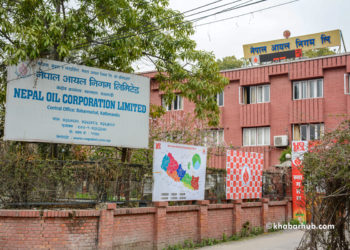GHUNSA: The family of Pembaphuti Sherpa from Ghunsa in the district has been suffering sheer shortage of money to avoid cold this season.
As the neighbours are all set to leave the settlement and visit Tarai districts to avoid cold, the family of Pembaphuti and some locals have no option but to brave the biting cold by making fire.
Among 40 houses in the village, few people including Pembaphuti’s family are worried about the chilling cold they are facing.
They could not arrange money needed to avoid the cold because no tourists arrived in their villages due to Covid-19. Even the potato products saw sharp decline.
“No tourists, low production of potato and no money to visit downhill this year, only option to stay warm is fire,” said Pembaphuti. Similar plight was shared by another local Pasang Chhokpya.
He said, “There is no good livestock for lack of pasture and growing attack of wild animals. No agricultural product and no tourists, where can we go this year?”
Every year, the people here go to downhill including Tarai districts, Kathmandu, and the cities as Sikkim, Darjeling in neighbouring country India in a bid to stay safe from biting cold.
Only few livestock farmers are bound to stay here. The locals here become free from regular works for four months from Mangir which are winter.
So, they involve in tourism activities, but this year, there are no tourists due to Covid-19 pandemic. As there is no source of income, they are bound to stay in the village despite severe cold.
Situated at an altitude of around 3,400 meters from the sea level, residents of Ghunsa are self-reliant through tourism, livestock farming, production of handmade carpets and potato farming.
However, the coronavirus pandemic has cast its impact on tourism sector and other income sources, said the locals. “The area failed to receive tourists this year due to the virus.
In the past, around 600 tourists would visit here in two tourist seasons. The local people would survive on tourism. Only 12 tourists visited here this year, thus reeling the locals under economic crisis,” said a local hotel entrepreneur Tashi Chheten, adding however domestic tourists have scantly visited the area due to the infection.
Livestock farming has been affected by the attack of wild animals and a lack of forage for them, aside from handmade carpet industries severely affected by the infection.
“Farmers have been in problems as their domestic animals have been attacked and eaten by wild animals. On the other hand, supply of handmade carpets to neighboring Tibet has been affected due to a closure of the transits with China due to the infection,” lamented another local Himali Chungdak.
Lately, the local people have started switching to the production of handmade carpet and hotel entrepreneurship as their livestock and potato farming failed due to various reasons.
The neighboring villages including Phale and Gyabla have also been bearing the brunt of the infection without tourism activities.
As a result, they are finding it difficult to make ends meet and pay school fees for their children. Some locals have sent their children to cities like Kathmandu and Indian city Darjeeling for education. “We are in problem to sustain due to the impact of the infection on tourism sector,” complained a local.









Comment